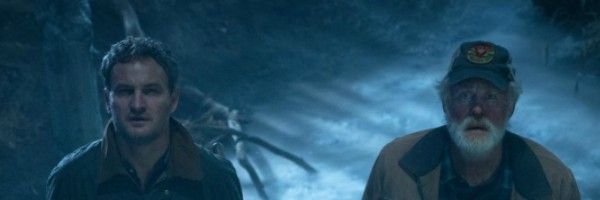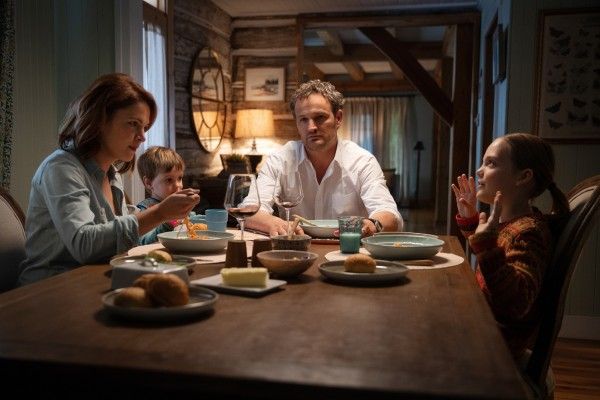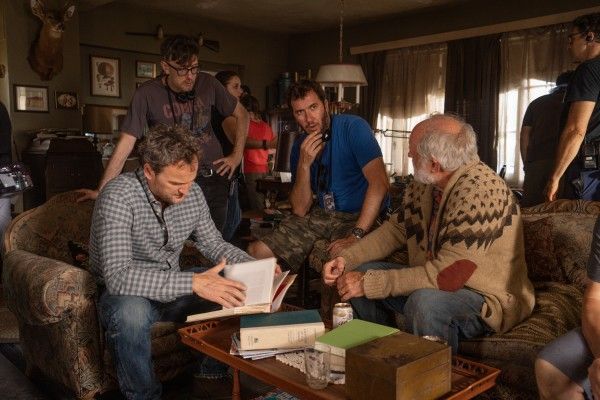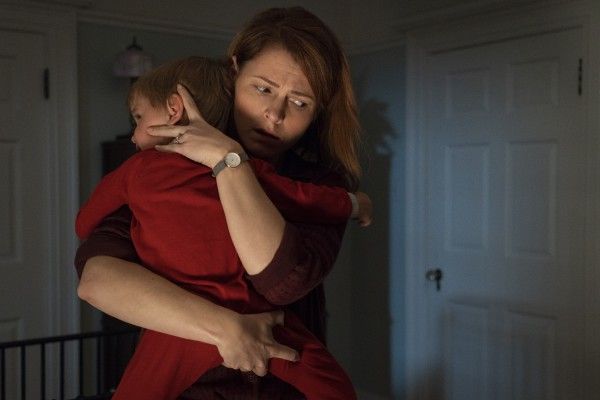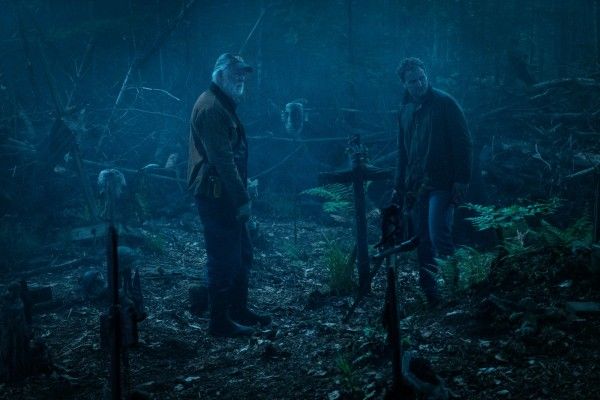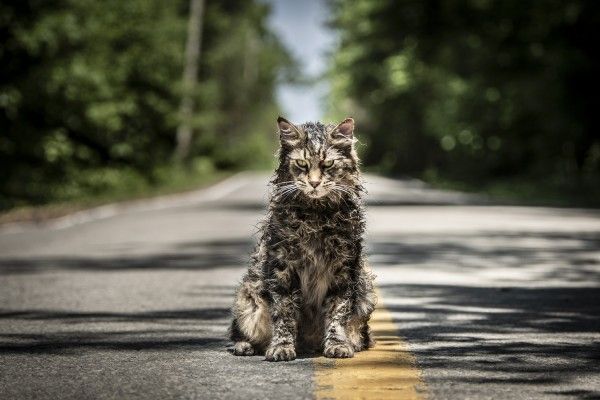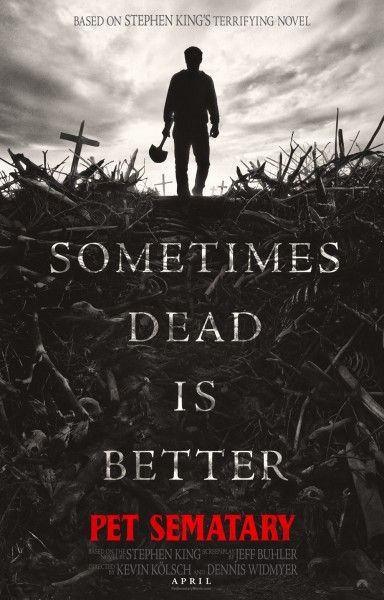There aren't many actors on the market right now who do instantly likable every man better than Jason Clarke, which makes the Dawn of the Planet of the Apes and First Man star the perfect guy to take on a lead role in one of Stephen King's stories. For Paramount Pictures' new spin on Pet Sematary, Clarke is taking on the role of Louis Creed, the doctor and family whose life turns into a nightmarish tragedy when he relocates his family to a remote countryside where the hills hold the power to raise the dead.
Pet Sematary isn't just one of King's most celebrated works, it's also one of his darkest and deepest, digging into the challenging muck of human grief and mortality. Fortunately, the film is in the hands of two exciting up-and-coming filmmakers, Starry Eyes helmers Kevin Kolsch and Dennis Widmyer, who assembled a knockout cast that also includes Amy Seimetz and John Lithgow, and as the latest trailer reveals, are taking some very big swings with the source material.
Last year, I had the opportunity to visit the set of Pet Sematary with a group of reporters in Montreal, where we observed filming and spoke with the cast and filmmakers. During a break in filming, Jason Clarke stopped in to talk about playing the film's lead, Louis Creed, and stepping into a world from one of King's darkest novels. The actor also discussed his personal love for the book (he's read it eight times and the detailed way he talks about the book definitely backs that claim up,) bringing Louis' complicated inner life to the screen, finding the chemistry with his co-stars, the complicated horror themes in Pet Sematary, and a lot more. Check out what he had to say in the interview below.
Do you find it hard bringing sympathy to a character when you know the audience is going to be going "No, you idiot, don't do it!"
CLARKE: I found the book more heartbreaking. You read it and I think the struggle is, it’s one of the great what ifs. What if you could? What if it’s just literally just four miles up there, what would you do? What would you do? I think everyone can relate to it. It’s just a normal dude, a dad who gets this dark secret and does something like Frankenstein’s Bride or Monster of Frankenstein. You create something and then it exists. But no, I like Louis. I really like Louis. I like that dark psychological journey, the problem that he’s got in the book.
Did you get a lot of time to get the chemistry of the family unit? You have this family that's transplanted into this country, and then he also finds a surrogate father, almost, through Jud. So did you get a chance or did you just figure that out as you're going along.
CLARKE: You get it as you go. I mean, John's pretty great. John's great, I like John, he's got that, that's kind of the natural thing anyway. As an actor, I've long loved his work in the theater, in TV and film, someone that can pass on knowledge and warmth, and experience and calmness. Amy, we just found that as you go, you know, and then the kids... Jete, the girl who plays the kid, because it was such a key role, and she was just great. She was great off the bat. For a little actress who claims her space and seems to really enjoy the process of playing a part rather than just... Well, you know, it's hard for kids, there's a lot of pressure on kids that they feel like they've got to get it right, or do right, or just make somebody happy, you know? And I felt that she goes a few steps beyond that and seems to want to stretch her work out and see where a scene can go rather than just get it right.
The book gives so much detail into Louis' life and turmoil, and in the film...I think you haven't seen the film?
CLARKE: No, I haven't seen the film, no.
In the other film, which maybe you'll see one day, presents him as a much more straightforward good man. And then when you go back and read the book, he's so conflicted. How do you bring that inner life to the screen?
CLARKE: I love it. I've read the book like eight times now. I really like the book. And it is a surprising book when you go back, like Lord of the Rings or something, you keep finding these different things you either hadn't read or you'd forgotten about. And there's a lot of surprising things. The sexuality that King brings to their relationship with Rachel, and the way he describes their sex. Because they're just an ordinary couple, and then he writes these sex scenes, they're almost so intimate they're embarrassing in a way, you know? But they really are. There's a real baseness to them, and a simplicity to them, and loving. They have a horrible argument about death, and Louis, "Don't bring it up," and it's kind of like... One of the really hard things with a book of this quality -- and Pet Sematary is a great book, I mean, it's a great book, and he's a great novelist, King -- is that you've got to let go of what can not be in it. There's so much going on. There's a really shocking part in the book I was really disturbed by...Have you guys read it, the book?
Yes.
CLARKE: You know when he's outside the gates of the cemetery, and he rings up Rachel, or Rachel rings and he answers the phone, and he says remember when Gage had that head problem. You forget, it's such a small thing, but he had a brain -- an enlarged head and they went to a doctor, a specialist, and there was a real chance that Gage was going to have a mental deformity when he grew up. And Louis says, "Do you remember that, would you have loved him if it had turned out that that's what he had? Would you have still loved him?" She said, "Of course I'd love him. He's our son." You realize, of course, it's cut with the fact that you know what Louis is going to go and do it, and it seems to be another of those reasons that just send Louis down that path. And that's not in this film. There's so many pieces. You try to put them in. He is a complex guy. He's a guy full of faults.
And he's our conduit as well as an audience.
CLARKE: Yeah, he's your conduit, yeah.
It must be such a hard balance because he's got this texture to him.
CLARKE: So long as you put something...I think, remember how in shark movies, "What if you're the last person in the water and they left you behind?" What if you're on the Titanic? That's what Cameron did. What if you were there? Well, what if you knew there was a place up on the hill where you knew you could bring things back to life? And once you accept that, it's a big thing for Louis, he says, "I accept this place is what it is now." You know, if you go, it's a burial ground, but once you accept that, a lot changes in his own mind. I think even for the audience. If you can be that conduit, and you can sit there and you can just imagine yourself at one part, doing what he's doing, and say, “Could I do this? Could I not do it? What would I do?” Then it gets beyond. It gets into a very disturbing place. And that's where I think the book lies, the story lies. It's very disturbing.
Why does that play in 2019? Why is that relevant and will resonate with audiences in 2019?
CLARKE: Well, I don't know, I mean people ask that with a lot of movies. Why is it relevant? I don't really care in one way, you know? I mean, a great story is a great story is a great story, I think. If you want to dig and have a look around, great stories are often about family, they're about that tight nuclear family, and then responsibility I guess is the other big one. I talked about Frankenstein before. If you're going to create Frankenstein, and the monster has life, and the monster has consciousness, it goes into a whole other level of responsibility, and what you're guilty of, and what you should take responsibility for.
I think this is one of King's great novels, and it's not like there's The Shining, there's the definitive version, only one film's been made previously. It's there for the picking. It resonates, this book, for a lot of people. It's a lot of people's favorite book. I think it's my favorite King novel, actually, too.
We watched you filming. The scene had a lot of room to breathe.
CLARKE: Which one? [With] Jud?
Yes
CLARKE: Oh yeah. [Laughs] It's easy with Lithgow. He's just one of those guys.
Do you find that that's representative of the sort of tone of the film, or is that a specific instance?
CLARKE: Yeah. I mean, look. You read a script, and I've done a few of these movies before, because Wyck Godfrey, who was the head of Paramount, sent this to me. I'd just done First Man with Wyck. And he said, "This is the first film I'm greenlighting, Jason." He'd moved over, on First Man, to Paramount. And he said Pet Semetary, and I thought, "I remember that book, I loved it." And you hope the script is good. It is things like that, that it has life. I mean, you look at The Shining. One of the great adaptations of any movie, of any book. And there always has to be room, there has to be life and breath and space within there for these universal themes, which still resonate, that allow the audience to be a conduit so you can come into them and feel like you're part of it. Or sitting there, you know, you're on this nice porch with lovely old man, and you start to feel you're at home, you know?
I think audiences are increasingly smarter. Audiences start to think and go where they want to go rather than give them exposition. There's always that need to, we'd better tell them what's going on, they've got to be sure of what's going on, it's like, you know what, I think they'll work it out, and if they don't, we’ll let them just be a bit more patient and wait for the next scene and you might find out then, or something. The script does have that. It's got license, as well as it's made some clear, strong decisions, I think, which bring out the best in the book. It's always a battle, you can't put everything in there, and it's silly to try and do put everything in there because you will then have a mess.
Was there anything from the book that you were hoping they'd put into this version that they’re not?
CLARKE: Yeah, of course. There are some wonderful scenes I'd love to have done, but it's impossible -- Another scene I love in the book... Just got be careful. Remember the scene where, the scene at the funeral parlor. There's an open casket, no, it was a closed casket because it was a massive crash, but Louis' father and his backstory there, with Rachel's father. And the animosity that exists within the relationship. And the fact that you know the animosity exists and that Louis is carrying on and that nobody's ever told Rachel, makes you kind of closer to their relationship and understanding, and it doesn't make them all such a nicey lovey couple. They've got problems. They have great sex. They've got issues and differences. But they're making it. They're a real family, they seem to be a real couple.
And then at the funeral, Louis gets beaten up by this old man. With his dead son. And he hits the old man or something, and the way that King gets into it, but then the old man actually beats him and kicks him and he wants his vengeance from years of anger. And on top of everything, there's the humiliation, and that he's behaved horribly. His son's casket comes open and he's thankful his son doesn't roll out. And that's also another thing leading into when he's digging it up as well. I'd have loved to, but you just can't.
You know, there's a few things. There's a phone call, where the old man apologizes. And he's got this other dichotomy running through it. He's apologizing, at the same time Louis is realizing it's too late. That car is Rachel's. He's piecing it together over the phone call. It's just this psychological mess of what he's become. You know?
There's a couple. There's a lot. [Laughs] I've read it eight times. I really enjoy the book. You can just pick up a little piece, and just refresh that piece with it before you go and shoot a scene. I guess the other this is that I can do that because I've marked the pages in the book, where I can say, this is my reference point before the scene, which I think is always good because if it was like it was a complete mess and nothing to do with it, I wouldn't be able to do that. But I can sort of go back and just read a little paragraph and go, okay, that's where I am going into this. This is what has happened just before now. He really describes his fear, and the sounds, and the swamp, and the loons to the south very well. Very clearly.
So you've done horror before, with Winchester.
CLARKE: Yeah I did one other one, yeah. I've backed it up again. Somebody reminded me about that the other day, actually. I thought, "Really?"
And I'm sure just as a film fan yourself, what are the elements for you that make a horror movie really work, and really sing, in general?
CLARKE: That's funny, because I watched...When I was thinking about doing this, I watched IT because I hadn’t seen it at the Cinema. I don’t normally watch a whole lot of them, I love The Shining, I loved An American Werewolf in London, and I loved The Exorcist. But I watched IT and you know that clown, it just freaked me the fuck out. I had to stop it. I was like, ‘I don’t want to do this with my day.” But then I loved that it gradually blended in to become these loners, losers, banding together to save this town, their souls, and this clown. So it became less scary as it went through. It became a very taut psychological drama. With magic in it, in a way. Then, by the end, with the clown, I wasn't wound up, as you are in these other ones where it's just horror, and you know it's going to get worse and worse. It seemed to get more open and cleaner and better as it went along.
I think a good one allows you to be a conduit. You've got to have something that scares the shit out of you, you know where you're leaning in, "aaah!" And leaning in, "aaah!" And that is great in itself, you know? But for me, the ones that have endured are the ones that are still great films, with great acting and great scenes, you know? That you want to go back and watch. Because, funnily enough, the horror genre is where great directors have often come from, where you learn your craft very cleanly. You have to understand the movement of your camera, there's a real language there which is used and abused, but often it can bring out some of the best people.
It's interesting you mentioned It because it does relent somewhat...
CLARKE: It has to. [Laughs] I mean, that clown with the arm and dragging him back to the top, and like, whoa!
Meanwhile, Pet Semetary, we talked about this earlier...
CLARKE: Gets tighter.
Yeah, it just gets dark, it doesn't relent, is that daunting for you, in this performance? This is one of his darkest works.
CLARKE: And it is, yeah. Yeah, I have my moments, I got kids, and some times I'm just like, "Dude, I don't know if I want to..." I don't think about it. I've done my work to get ready for it. If I kept thinking about it, kept looking at kids,,, because it is full on, you know? Those things are coming up, I'll shoot those, you know. I keep bringing up Doctor Frankenstein. There's a real thing of that, isn't there? You've got to kind of confront what you've done, and what you do, and who knows what we do? Louis goes down a dark road, man. But I think the road is believable, that once you've accepted certain things, that we could all go down without making a direct step out of it. He just keeps going down, doesn't he?
It's interesting too, because Louis is a man of medicine, and then as the movie goes on, he almost becomes more spiritual because he's getting absorbed into this Native American legend, and all that good stuff. Is that also appealing for you as an actor to take that journey?
CLARKE: He's not just some bumpkin coming along, no. There's the medicine thing and the fact that he doesn't believe in afterlife. He's seen too much death. But also the other side of it is that idea of playing God. Surgeons, and saving life, that whole thing of the hands of God. That they have that ability, and they have saved someone. In that split second. That almost becomes a trap for him as well, and here he is, bang, up there. Burying his kid.
And there's that psychological element, too, where you have the Pascow character that's haunting him. So you've got the the physical horror of the son, and then the mental element with Pascow stuff, has that been fun for you to play with?
CLARKE: Yeah, we haven't actually shot any. My first Pascow scenes are tonight. But yeah, I thought about this. When you're there at the moment of death, if ever you guys would be there, it's a moment. It's the end of a life. The couple of times that I've seen it, you feel that. I guess if you've been a trauma surgeon you've seen quite a bit of that, too. You're there at the end, like homicide detectives or first responders. You've seen a bunch of moments of the end of life.
Perhaps, a much lighter question.
CLARKE: Go for it!
Just like we saw the Orinoco truck out there, you know from the King universe and everything, has somebody been giving you like, the list of all the Easter eggs.
CLARKE: There's a few of them. I got measured for a wig for another job the other day, and the guy measuring me talked about King's relationship with his father. And then it reminded me the scene we just shot, because he asked me. The father, he's never really there. And that was it. Basically, there was an interview where King said that. There's so many of them, dude. I kind of try to keep it down because for some of them it's their favorite Stephen King novel. And I don't need to know that, dude. I'm going to shoot it and see how it goes. But you know, you forget. It's very easy to forget with Stephen King, how prolific he is, and how great. He's written some great novels. It's not even arguable. He's one of the great writers. As well as the highest grossing writer, isn't he? The highest selling writer of all time? He's phenomenal, and he's just down the road. Literally, he's not far away, if you just cross the border there, you know? Back up here for the summer.

